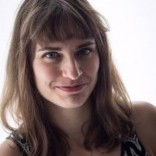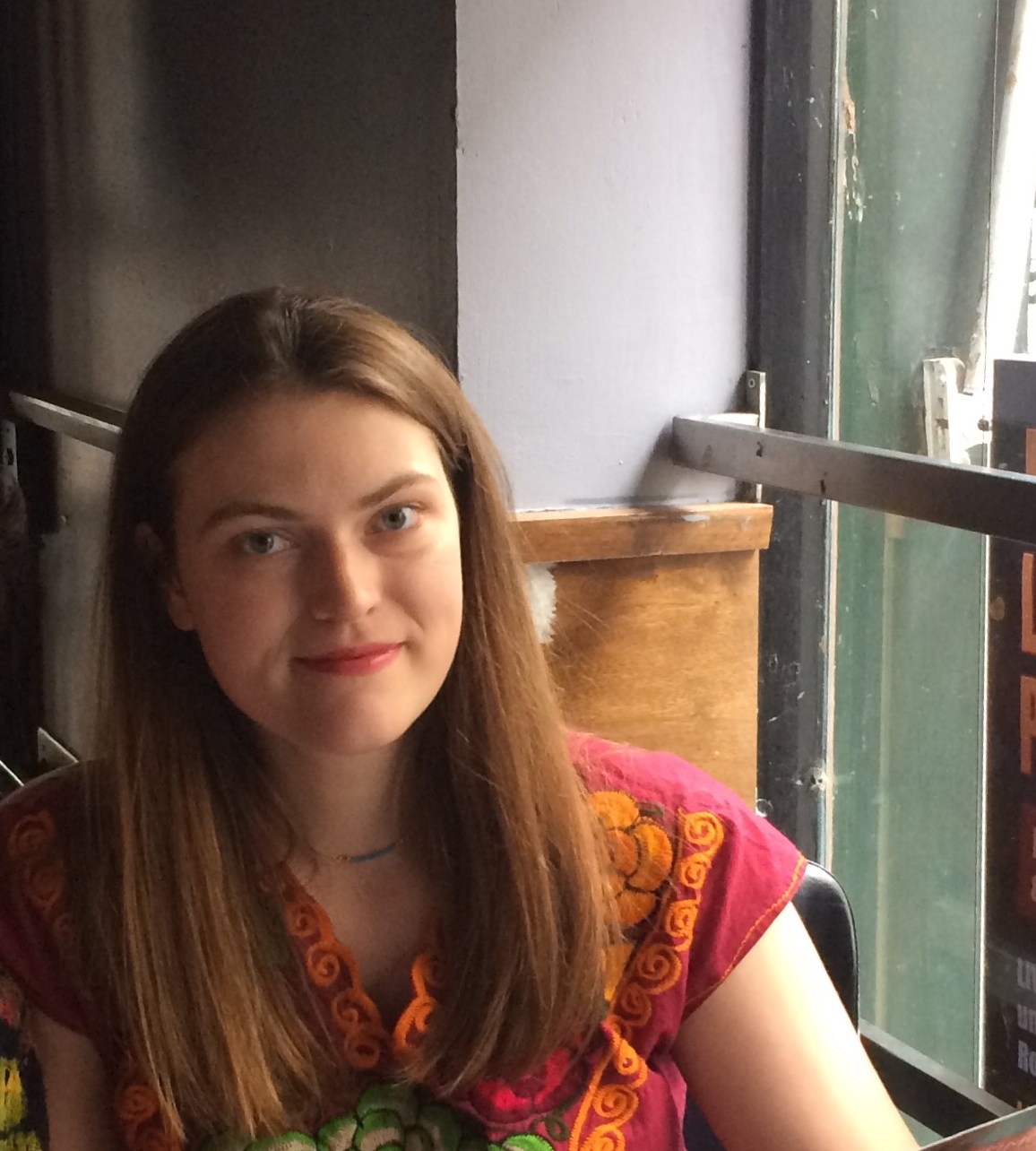The Girls
Ruby Al-Qasem
We grow up barefoot and running: our feet pounding the hard-packed dirt that serves as a road winding into the ranch, our toes hugging the cool green grass of the evenings, or crashing through heaps of furled brown leaves in the woods that stand north of our house. Our mom shakes her head with exasperation because when she tells us to put on shoes, we ask if we are going to town. Mom is from Houston and maybe can’t quite reconcile the city girl she had been with the country girls she is raising, two hundred miles from the city she belonged to once.
Our house is small, though we don’t know it. Our dad built it himself. He owned a construction company in Houston before we were born, but a fall from a building broke his back, and the veterans’ hospital surgeons made him worse instead of better. Sometimes he can’t bend over to pick something up; sometimes he can’t get out of his chair. But sometimes he can ride in a tractor, he can feed horses, he can build a treehouse. These tasks cost him too much, but he loves to be in the hot Texas sun and he takes pride in everything he does. He has strong brown fingers that are thick with ranch work and when he encircles our wrists or ankles he never hurts us, but we can’t wriggle free either, no matter how hard we pull, and we always end up having to shout “Open sesame!” in a collapse of giggles to get free from those strong hands.
Our school is small, thirty kids and two teachers to a grade. Our teachers all know each other or are cousins or are related by marriage or by school board husbands. Our teachers mostly like us. The oldest of us is kind of a smarty-pants. Sometimes being smart is the only way we know how to know ourselves; sometimes we are tougher than the other kids, or braver, instead. In such a small community, we have dual identities. To the grownups, sometimes even to our teachers, we are the same: one of the Cummins girls, or even, one of the school kids. When we filter through a homeroom that older sisters have already moved on from, the teacher sometimes calls us by our sister’s name, expects us to make her grades. If we are quiet and make good grades, the teachers worry about us. She’s too serious, our teacher tells our mom. When we break the rules and pass notes in class or write cuss words inside the covers of our textbooks in pencil, we get in trouble. She talks too much in class, our teacher tells our mom.
Among the other kids, though, we are afforded the luxury of individuality—this one is Ruby, the oldest. That one is Amanda, the middle. The littlest one is Katie, born years after the other two. They all have long hair and bangs and freckles and pretty eyes. They are all bad at sports. But this one has green eyes, the others, brown. That one tried out for cheerleading and didn’t make it. This one plays piano at church sometimes. Among our circle of childhood friends and enemies, we are ourselves, but in the wider world, we are only three of many. In the small town and surrounding farms and ranches, we are stuck in a circle of sameness. We go to the same church or two, we overhear the same politics, we get the same nine or so TV channels, we buy our groceries from the same Brookshire’s, and our mom turns those groceries into the same southern recipes that our friends sit down to eat at dinnertime.
We are stubborn and don’t like to be bossed around. We have no brothers. We are the bosses of our own selves. We are hard-headed, Mom says. We are mean and lock each other in our closet. We steal the treasures we covet from each other and hide them away and forget about them; we find them months or years later: a pair of pink sparkly Barbie shoes, or a delicate squirrel skull, or a gumball machine slap bracelet—secured between mattresses or stored in the Yahtzee cup among mismatched dice. We share our toys. We refuse to share. We pull the ladder up into the treehouse so one sister, or two, can’t come up. We don’t like to share our friends when they come to stay the night. Go away, this is my friend, you’re too little to play with us. We are very selfish. Dad chastises us: Someday you won’t even remember that girl’s name, he tells us, But your sister will always be your sister. We ignore him; we think this is a silly thing that will never happen. Our friends will be our friends forever, and our sister is being a pain in the butt.
We are very sweet and love animals more than anything. We have seen our mom rescue small velvety bats from barbed wire fences and doctor their torn wings before setting them free again; we have accompanied her halfway back to town in the pickup to rescue a dog that she spotted on the way home; someone has hit the poor thing with a car. The dog doesn’t make it through the night but, Mom says, at least she died on a warm blanket with some food in her belly, not alone by the highway. She knew someone cared.
We have more pets than any other kids at school. When our shoes are store brand or our clothes are hand-me-downs, which is mostly always, we can brag about our many pets and the other kids will be jealous. It is another way of trying to be special. We have normal pets, like dogs to play chase with, and kittens to find under porches and cuddle, and horses to ride in the pastures and whisper secrets to in the barn. And we have not-so-normal pets, like hermit crabs Dad lets us bring home from Galveston beach, and baby snakes we find under cinder blocks and put in jars, and a big cage of turtles. Our dog Raven loves to catch turtles; she brings them to us in the woods as we play, still alive. How she carries their large slick shells in her teeth is a mystery. We put the turtles all together in a very big cage that Dad lets us use, which once housed rabbits. Every morning during the summer of the turtles, we troop outside after breakfast to fill a jar with squishy crickets and gangly grasshoppers, and then we sit on the dusty ground by the cage, and feed all the turtles. Mom is thoughtful and saves pasta sauce jars and pickle jars to house our many pets, which sometimes include interesting spiders we have found under the eaves of the horse barn. She washes and dries the jars for us, and pokes holes in the metal lids with the wood-handled icepick so that our captives can breathe.
When we are girls, our heels are hard and our fingernails are dirty. Mom makes us take baths every night, even in summer when school is out. We don’t mind being dirty; we smell like bluebonnet flowers and decaying leaves and friendly dogs and sunshine. We think that is okay. But bathtime is okay too because we pretend we are mermaids.
When we are girls, Mom and Dad convert an old chicken house into a playhouse for us. Mom sews basic curtains; chicken wire covers the windows but a nice breeze passes through. Dad paints everything in fresh white paint, except the floor, which is forest green. Our fiberboard play kitchen gets moved out to the playhouse; sometimes we play family but mostly we play witches. Mom doesn’t care what we read, as long as we are reading, and she lets us check out books on the occult from the school library during the summer, even though the librarian purses her lips and looks at Mom over her spectacles. We learn all about séances and witch lore. We have witch hats and dresses from Halloween, but cutoffs and faded Little Dribblers T-shirts will do on hot summer days. Witches wear what they want. We collect dandelion puffs and thistle blooms, acorns and pink veiny pebbles like small knobs of flesh—these are perfect dead men’s toes for our potions. We designate various unfortunate cats our familiars; these cats would rather be resting in the shade than lugged all through the woods by sweaty girls, but they mostly acquiesce.
When we are girls, some of our best friends are boys. The boys like our wildness, our willingness to create makeshift slip-n-slides with trash bags in the yard, or to go swimming in a muddy tank. They like our ability to name almost any insect, to spot water moccasin snakes from far away, to use grasshoppers for bait if we don’t have minnows or have lost the good spinners. We know how to play when boys come over, and how to play when girls come over. We love the dollhouse Mom and Dad built for us, with its real lights, as much as we love our butterfly nets and our fishing poles.
When we are not really girls anymore, and we begin to change into something else, our hard, dry heels bother us. We stop wearing jelly sandals and begin to wear leather ones with slim gold buckles at the ankles. We don’t know what to do about our heels, though. We save up our allowance and buy name brand shoes to wear on the basketball team. We ask our mom how to get our elbows soft like hers and not like sandpaper. You have to put lotion on them every day if you want them to be soft. We are incredulous. We didn’t mind the daily task of catching dozens of soft-bodied black crickets for the turtles, but daily lotion application seems excessive. But Mom shrugs. Yes, every day.
We watch the popular girls at school and try to copy what they do. But we don’t copy so blatantly that they might notice that’s what we are doing—then we would be ridiculed. We know all the rules of being less-than. We copy little things; we roll up the sleeves of our t-shirts so we might show off our trim, tanned arms. We tie blue ribbons into bows in our ponytails. We never wear pigtails anymore, until the cheerleaders begin doing it again. Mom fixes our hair for us until one day she doesn’t. It is a different day for different ones of us, of course. You’re old enough to learn to do your own hair now, she tells us. We feel proud and grown-up but also angry. We like sitting on the floor between her legs as she perches on the edge of the couch; we like the strong tug of her pulling our hair into braids or some-up-and-some-down. We like running our hands over her shins, which are prickly because it is time for her to shave again. We do not like how our arms ache when we have to stand in the bathroom doing our own hair. We can never get it to look like the girls’ hair in the Seventeen tutorials, no matter how many bobby pins or how much Aquanet we use.
Dad gets upset when we cut our ankles shaving. We hop into the living room after our baths, trying to keep from dripping blood on the carpet by pressing strips of toilet paper to the bone where we have scraped off a layer or two of skin. The blood blooms on the white toilet paper like a flower unfolding in the old Disney time-lapse nature videos. Mom is unfazed. The ankle is a tricky spot. Dad doesn’t like it though. He wants to buy us expensive razors but Mom won’t have it. It’s a waste. They’ll learn. And we do.
When Mom dies, we don’t understand what has happened to us, though we understand what has happened to her, because we’ve had to repeat what the doctor told us over and over again to everyone who asks with a confused shake of their head. Her pancreas overacted. It ate her from the inside out. We don’t describe it that way though. We use the medical terms because they sound less gruesome. We explain that she has not been herself for a year, but the doctors thought it was high blood pressure, bad diet, migraines maybe. The doctors did not know she would become violently ill one day, and die the next. We understand what has happened but we don’t understand why. We understand that our lives now will be different, but we can’t understand how different. We are fifteen years old. We are thirteen. We are only six years old.
We wear purple to Mom’s funeral, because we can’t bear to wear black. We wear black, because we can’t bear to wear colors. We choose a couple songs from her ragged Cokesbury hymnal and everyone sings them together at the graveside. We hold Dad’s thick hands. We do not let go. He cries and cries. We cry. We don’t cry. We flirt with the preacher’s son, because we still can’t really believe that Mom is dead and that we are there to put her body in the ground. We won’t believe that. We pretend that she is gone visiting relatives or something, back to Houston maybe, and this makes it so we can flirt with the preacher’s cute son without feeling guilty. We are perfect hostesses when people come to the house later. We arrange the baskets of flowers and the glass dishes of casserole; we dig stacks of paper plates out of the pantry. Or we disappear and no one can find us. When they do, we are curled in a ball out in the barn, at the feet of a giant horse. We don’t talk. Dad has to pick us up even though we are too big for it, and carry us back inside the house.
We grieve alone in our rooms while we blast music, or in the treehouse confiding to a friend, or in Dad’s lap if we are still small enough to fit. We take care of each other. We take care of Dad. We eat whatever he cooks and we don’t complain. Or we eat sandwiches or Spaghettios and we tell him we’re full and it’s okay if he wants to lie back down. We stamp our feet and refuse to go to kindergarten; when Dad leaves us with the sweet kindergarten teacher who has taught all of us so far, we cry pitifully. We hop out of the truck when Dad drops us off at junior high or high school and pretend that we are not scared to go back to school with no mom. We accept our friends’ hugs and pretend we believe the cheerleaders when they say how sorry they are. Maybe they are, even if they called us a bad name last week. We can’t tell what is true anymore and what is not. We refuse to nap at naptime and the kindergarten teacher sits on the floor with us behind her desk and just holds us, rocking and rocking, while the other kids nap on their red and blue plastic mats. We cry until we can’t cry anymore.
We love to sing and we listen to Mom’s music more and more, even though we used to hate it. We pull out her old records—Olivia Newton John, Simon and Garfunkel, the Beatles—and we play them while we vacuum the living room and dust the piano and throw away the flowers that all died and wilted and cannot sit there another day. We survive kindergarten; we discover kickball in first grade, and painting. We will become artists someday. We survive ninth grade and move to tenth; we survive seventh grade and move to eighth. We like science and decide to be veterinarians. Or we hate science and decide we will become writers.
We discover boys. We don’t date until senior year and then we date the nicest boy in the class, even if he is kind of boring. Or we start dating when we are sixteen and lose our virginity before we really want to. Our boyfriends are the same age as us. Or they are a couple years older. Our boyfriends are from nearby schools and the cheerleaders are jealous of us at the Homecoming Dance because our boyfriends look sexy in their jeans and drive red sporty cars. Our boyfriends are muscular, or thin, or pudgy; tall, or short. They have broad shoulders and brown or blue eyes; they play baseball or football or tennis. Two of our boyfriends are self-proclaimed history buffs. One does Civil War reenactment and we don’t think it’s stupid at the time. He has a real musket. Our boyfriends are in one-act plays with us. We get the part that includes a cool death scene on stage, and are thrilled that our boyfriends get the part of the gent to carry us offstage each performance; we are draped limply in their arms, our faces serene and ashen with the makeup we furtively applied while the house lights were down between scenes.
Our boyfriends are the sons of our teachers and coaches, the brothers of our girlfriends. They come from out of town, moved here in junior high, or we meet them at church camp, or we have known them all our lives. Our boyfriends buy us fake silver lockets and have roses delivered to the school on Valentine's Day. Our boyfriends teach us how to play Texas Hold ‘Em. They teach us how to give blowjobs. They teach us how to line dance. They sit next to us in church and keep us out past our curfews; we lie to Dad and say the road was flooded and we had to go around. They teach us how to play flag football. They are afraid of how fast we drive our four-wheelers through the woods at night in the dark. We are not afraid of anything. They don’t like our old playhouse; they bump their foreheads on the door as they pass through. It’s a good place to mess around, though, they say. They laugh at our play kitchen. They tell us we are pretty. They ask us to marry them. They tell us they want to break up. They don’t tell us why. Dad lets us skip school because we are so upset, and takes us to breakfast at the café with the good peach cobbler. We don’t understand why our boyfriends dumped us. Dad is sympathetic. He calls the boyfriends sonofabitches. He doesn’t much care for any of them.
Our boyfriends get us pregnant and go with us to get an abortion that nobody ever knows about. We can’t tell our sisters about this; we are alone. We stop eating until we can afford it, so no one will know, and because we kind of hope that if we don’t eat, maybe it will die by itself. Sometimes when we can’t bear the hunger pains, we eat something, but then we force ourselves to throw it back up. We wear baggy shirts and hope to see blood in our panties every time we go to the toilet. We become very thin. Sometimes we think, if Mom were here, she would not have let us stay out so late with our boyfriends. This would not have happened. Dad doesn’t know any better. He only wants to make us happy. Dad stays sad almost all the time; he loved Mom too much. Our boyfriends do not love us; when we tell them we are pregnant they get angry. They are mean. We are afraid they will hit us. The blood doesn’t come, and we return home from our secret abortion and we crawl into our twin bed with the blue gingham comforter that Mom bought us. We tell Dad we are sick, and it is not a lie. We bring our sister who is sick a Coke with ice. She is grouchy all the time now and we don’t know why. She has gotten so skinny that none of her clothes fit and she stays in her room and doesn’t tell us stuff anymore. She lets us sit on the edge of the bed for a few minutes, and she looks at our latest drawing. She is paying us back for the Coke. Or we yell at her for missing our game. You don’t look sick to me. We lie to each other, and to our friends. We believe each other’s lies, or we don’t. We believe our boyfriends’ lies, or we don’t.
We can barely remember the spitfire girls we were once, the girls who wouldn’t take shit from anybody, the girls who were the bosses of their own selves. When the boyfriends get bored or angry and go away, we comfort each other the best we can. He’s an asshole and you deserve better. Screw him. But our self-esteem is maybe not so great. We each seem to be broken in some way, and we don’t have a clue how to fix ourselves or each other.
We grow up, because there is nothing else to do. We become writers or artists; we work with animals or we work in business. We wait tables or stock shelves to pay for college. We get degrees, or we drop out and don’t go back. We go home when we can, to see Dad, and to feel the warm summer mud of the road squish under our feet and see the trees shiver their leaves down in showers every fall. We watch Dad get older and sicker and die before his time, no matter how hard we have tried to force him to eat better, begged him to rest once in a while, no matter how many doctors we have dragged him to or how many late-night screaming phone conversations we have with each other, debating how to get him to take care of himself, or how we can take care of him, who can do what. He is not well, we know, but in some ways he has never been well, and we are used to it. He is a fighter; he is the strongest man we have ever known. He is still somehow mostly fine, mostly himself, and then suddenly he is gone. We are bereft; we realize that losing him has truly set us free in the world, though we may have been grown up for some years now, and we are exhausted, relieved, and horrified by this.
We have husbands, or boyfriends. We have tried to choose men who are nice to us, who are smart. We don’t worry whether they were the quarterback on the football team or whether they drive cool cars; we worry whether they will be kind. Whether they will try to boss us around, or talk over us when we are talking. We have learned what things to look for, and look out for. Even so, as we get older we discover new things that we should have avoided, and didn’t. These men keep us from collapsing when we stand by Dad’s casket in the small, too-familiar funeral home. They zip up our black dress, or come downstairs to check on us when we stay up all night watching trash TV because we cannot face our darkened bedrooms. They tell jokes Dad used to tell, to help us remember. They are supportive.
After enough time, our husbands stop grieving, and they are surprised when we begin to cry in the dairy aisle at the sight of Mom’s favorite butter or when we wake up and feel we cannot get out of bed because our dad died nearly two years ago. These men have both their parents and all their grandparents. They do not understand that losing Dad is losing Mom again. They do not understand that losing both parents is losing home. They try to understand, or they don’t. They are kind and patient, or cruel and dismissive. They have other things to do. They are not supportive. They suggest we have a baby. They let us know, with their silence, that we have used up a marriage’s worth of tears. They are tired of us. Probably they are afraid to really look at us, to witness what death can do to a person. Maybe they wish we were strong and brave. We try to tell them who we were, but we give up.
We have children. Or we don’t. Or maybe we will, and haven’t yet. We talk to each other at least once a week, but sometimes we are too busy and two or three weeks pass. It’s just us now, we remind each other over the phone. It’s up to us to remember everything, because Mom and Dad are gone and we have to remember the stories of our family. We all agree that stories are very important. We decide that we should get together at least once a month. A lot of the time, we are lonely. These meetings will help, we decide. Sometimes we keep this promise, to see each other at least once a month. And sometimes we don’t. Mostly we don’t. We are busy. Your sister will always be your sister, Dad said. We vow that this will always be true, but we are also Wives now. Mothers. Employees. Teachers. Students. We have promised away so many parts of ourselves, and we find that whatever is left over sifts through our fingers like a handful of dry hot sand.
Sometimes we whisper to each other that we will leave our lives and move back to the ranch, all together, and we will be the bosses of our own selves. Sometimes we sob this promise into the phone; sometimes we laugh it across a table scattered with coffee cups and Monopoly pieces and cell phones. In this board game moment, a moment stolen from husbands and children and work, it is easier to believe we will keep the promise. We will have a garden, we say. Kids in town will think we are witches and we will let them think it. We will have dessert for breakfast and breakfast for dinner and we will say any vulgar thing we like and we will swim in our swimsuits and not hide our bodies or maybe we will swim naked, with only bluebonnets woven into crowns in our hair. We will play Mom’s record player all day on the weekends while we clean the house. Or if we feel sad, we will stay in bed all day and we will take care of each other. We will bring tea and books and chocolate to each other until we feel like we can get up again.















